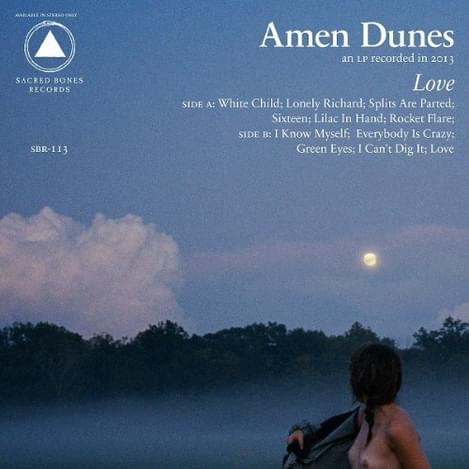Amen Dunes - Love
"Love"

Love is McMahon’s third album as Amen Dunes, and, for every step forward it takes over its (really rather good) predecessor Through Donkey Jaw, it takes another two back. The lo-lo-lo-fi of previous records has been eschewed in favour of plain old lo-fi, with the consequence that McMahon is able to exercise a great level of control – his voice higher in the mix, discernible moments in which a particular instrument rises above the fug – but this isn’t necessarily to the benefit of the music. Where Jaw’s success rested on its mystery, its smoky, nocturnal atmosphere built on layers of psych-folk-noise, Love’s cleaner production and more structured approach to songwriting puts greater onus on McMahon to hit the big hooks. Behind the desk are Dave Bryant and Efrim Menuck of Godspeed, whose usually expansive production seems ill-suited to Amen Dunes’ intimacy, and so it proves; there is an almost palpable tension between McMahon’s personal style and the desire of the Godspeed duo to shoot for something bigger.
The Elias Bender Rønnenfelt (of Iceage fame)-featuring “Lonely Richard”, with its churning acoustic guitar and lap steel twang providing the backdrop for Rønnenfelt’s chanted vocal, “have yourself a good time!”, is a perfect example of McMahon taking his existing platform and building on it. Later, the meandering “Everybody Is Crazy” is perhaps the album’s only moment of real balance, a quiet psychedelic cut that nonetheless feels like it is hiding something bigger. Its baseline throbs in the background, the whole song sounds like it is always just about to burst into life. It is telling, however, that the album’s best moments are those that sound most alike its predecessor, and its weakest moments are those where it feels like you can pin-point a direct influence, a new direction in which McMahon is trying to move out of his comfort zone. The check-list of influences is strong – from contemporaries Kurt Vile and early Animal Collective to classic rock stalwarts Neil Young and Velvet Underground – but often this just serves to remind of where you’ve heard this done before, better.
For an album titled Love, much of the record is oddly emotionally muted. The press release notes that Love is “the product of close to a year and a half of continuous work”, which may in itself be a large part of the problem. The spontaneity and lo-fi, one-take instantaneousness of the earlier works was a huge part of their charm, that sense of the album existing as a direct line between artist and listener. Here, on “Green Eyes”, McMahon sings “In the ocean, no emotion, that’s the sound of devotion”; there is no question that this is a work of devotion, even a work of love, but as a document of raw emotion, it is lacking, it feels overly considered. It’s unfortunate, with so much to admire, that Love is ultimately an unedifying experience.
Get the Best Fit take on the week in music direct to your inbox every Friday








